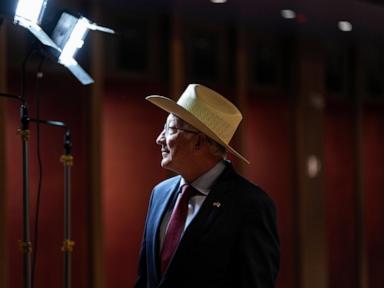'Americas First?' A second Trump term could be a renaissance for Latin America

The prospect of Donald Trump returning to the White House in 2025 has sparked intense discussion about the future of U.S.-Latin American relations. While critics focus on potential tensions, a closer examination reveals how Trump's "America First" approach could catalyze a long-overdue transformation in hemispheric relations, ultimately benefiting both the U.S. and its southern neighbors.
At the heart of Trump's Latin America strategy lies a refreshingly clear-eyed view of regional dynamics. Rather than perpetuate decades of well-intentioned but ultimately ineffective policies, Trump's transactional approach could forge more authentic and sustainable partnerships based on mutual economic interests rather than abstract diplomatic ideals.
Take immigration, for instance. Trump's emphasis on border security, while controversial, could finally force a serious regional dialogue about sustainable migration policies. By pressuring Central American nations to strengthen their domestic institutions and economies, his policies could address the root causes of migration more effectively than traditional aid programs that have shown limited results.
On trade, Trump's bilateral deal-making strategy might actually advantage Latin American nations. Even though his critics decry the departure from multilateralism, the reality is that personalized trade agreements could better address each country's unique economic circumstances. Trump's business background and focus on bottom-line results could lead to more practical, targeted trade arrangements that deliver concrete benefits to both sides.
Perhaps most significantly, Trump's pushback against China's growing influence in the region might provide Latin American nations with unexpected leverage. Rather than simply forcing countries to choose sides, Trump's competitive approach could spark a bidding war for Latin American partnerships, potentially resulting in better terms for regional economies. His administration would likely offer attractive alternatives to Chinese investment, creating genuine competition that benefits Latin American nations.
Trump's "America First" policy, contrary to conventional wisdom, could accelerate Latin America's march toward greater autonomy. By challenging traditional diplomatic assumptions, he could push regional leaders to develop more balanced international relationships and stronger domestic institutions. This tough-love approach might be exactly what the region needs to break free from historical patterns of dependency.
The much-discussed revival of the Monroe Doctrine under Trump need not be seen as a return to paternalism. Instead, it could evolve into a more equitable partnership based on shared economic interests and regional security concerns. Trump's focus on tangible results over diplomatic niceties could lead to more honest, productive relationships throughout the hemisphere.
Critics who dismiss Trump's approach as simplistic miss its potential to reshape regional dynamics in positive ways. His emphasis on clear expectations and measurable outcomes could replace decades of diplomatic ambiguity with more transparent, results-oriented partnerships. This clarity, though sometimes uncomfortable, might be precisely what U.S.-Latin American relations need to move forward productively.
Latin American leaders who approach Trump pragmatically might find unexpected opportunities to advance their national interests. Rather than resisting change, they could leverage Trump's deal-making instincts to negotiate better terms for their countries while maintaining their strategic autonomy.
A second Trump presidency could indeed mark a turning point in U.S.-Latin American relations. While it would certainly bring significant changes, these changes might ultimately strengthen rather than weaken regional ties. By forcing both sides to reassess long-held assumptions and negotiate more practical arrangements, Trump's approach could pave the way for a more mature, mutually beneficial relationship between the United States and its Latin American partners.
In the end, Trump's unorthodox style might accomplish what decades of traditional diplomacy could not — a genuine recalibration of hemispheric relations that better serves the interests of all parties involved. Sometimes, the most promising paths forward are the ones that initially appear most disruptive.
Kurt Davis Jr. is a Millennium Fellow at the Atlantic Council and a member of the Council on Foreign Relations. He is also an advisor to private, public, and state-owned companies and their boards as well as creditors across the globe on a range of transactions.
-
What a second Trump administration could mean for America with a GOP-led Congress
Top stories - CBS News - November 6 -
What a second Trump term could look like
Top stories - CBS News - November 6 -

AP Week in Pictures: Latin America and Caribbean
World - ABC News - October 25 -

AP Week in Pictures: Latin America and Caribbean
World - ABC News - November 1 -
How China Capitalized on U.S. Indifference in Latin America
World - The Wall Street Journal - November 14 -

AP Week in Pictures: Latin America and Caribbean
World - ABC News - November 14 -

It’s ‘Trump’s America’
Top stories - The New York Times - November 6 -

Trump's Latin America policy to likely focus on controlling migration, former ambassador says
Top stories - NBC News - November 13
More from The Hill
-

Top Florida health official advises against fluoride in drinking water
Politics - The Hill - 4 hours ago -

Trump taps NFL player Scott Turner as head of HUD
Politics - The Hill - 6 hours ago -

Trump names Seb Gorka, Alex Wong to be senior national security staff
Politics - The Hill - 6 hours ago -

John Hopkins surgeon and COVID contrarian Marty Makary selected to lead Trump’s FDA
Politics - The Hill - 6 hours ago -

Trump Cabinet picks: Here’s who’s on the list to carry out his agenda
Politics - The Hill - 6 hours ago